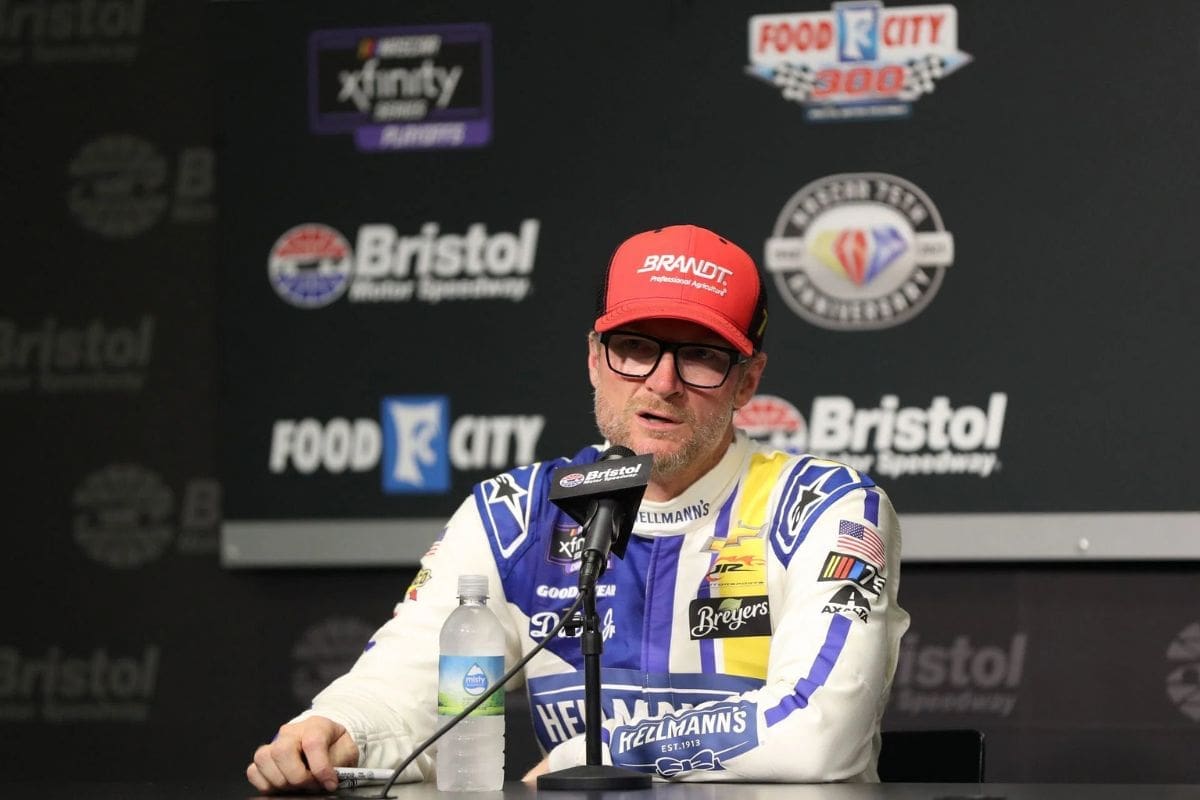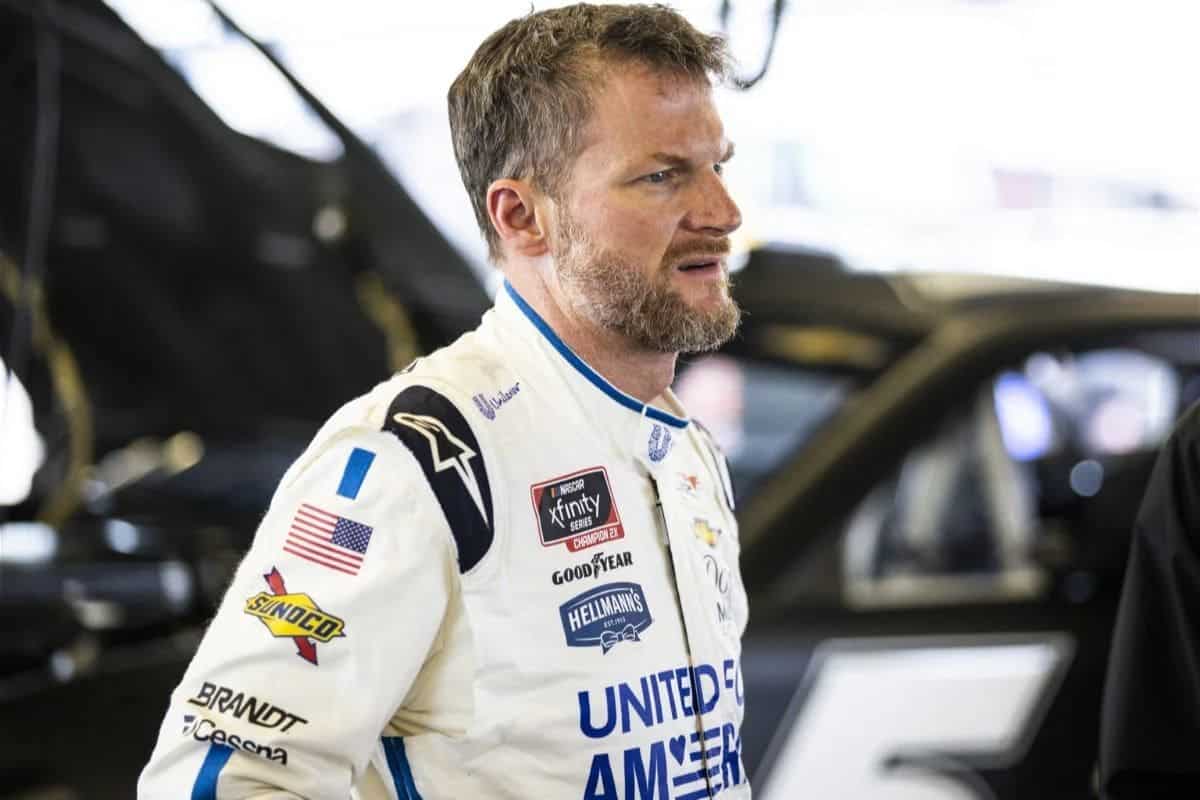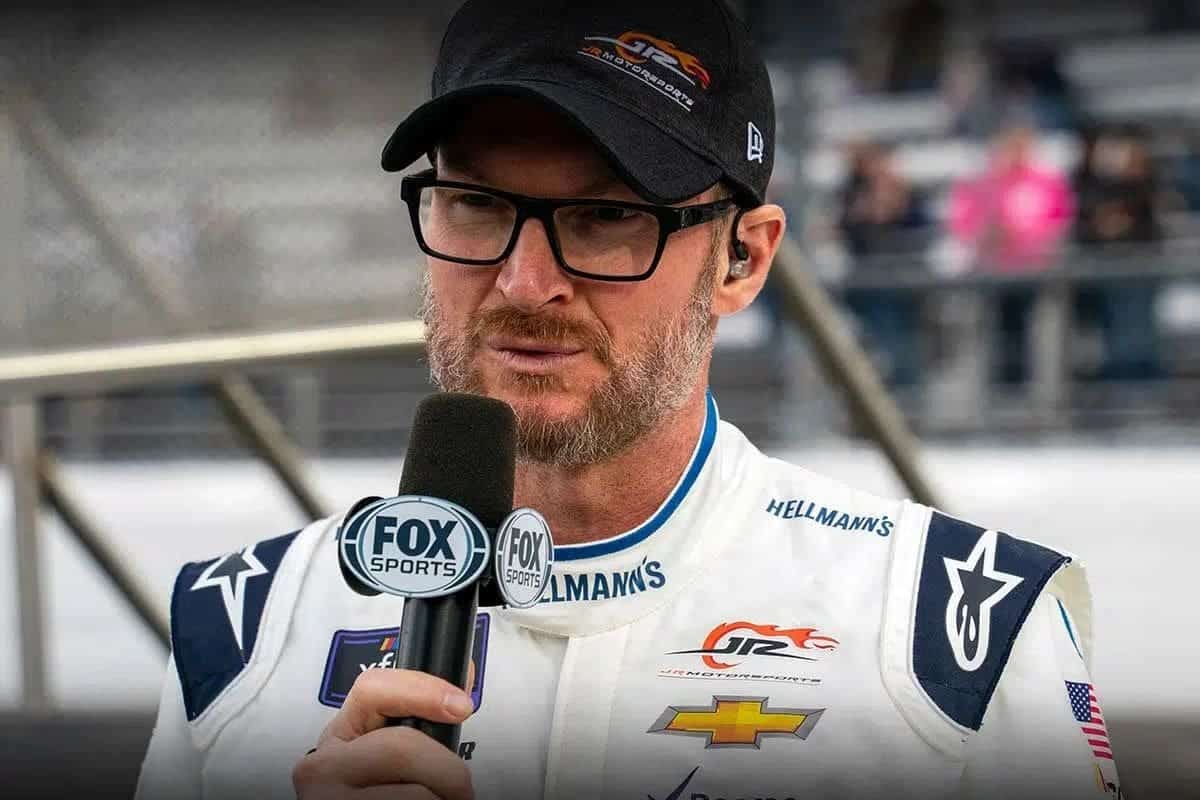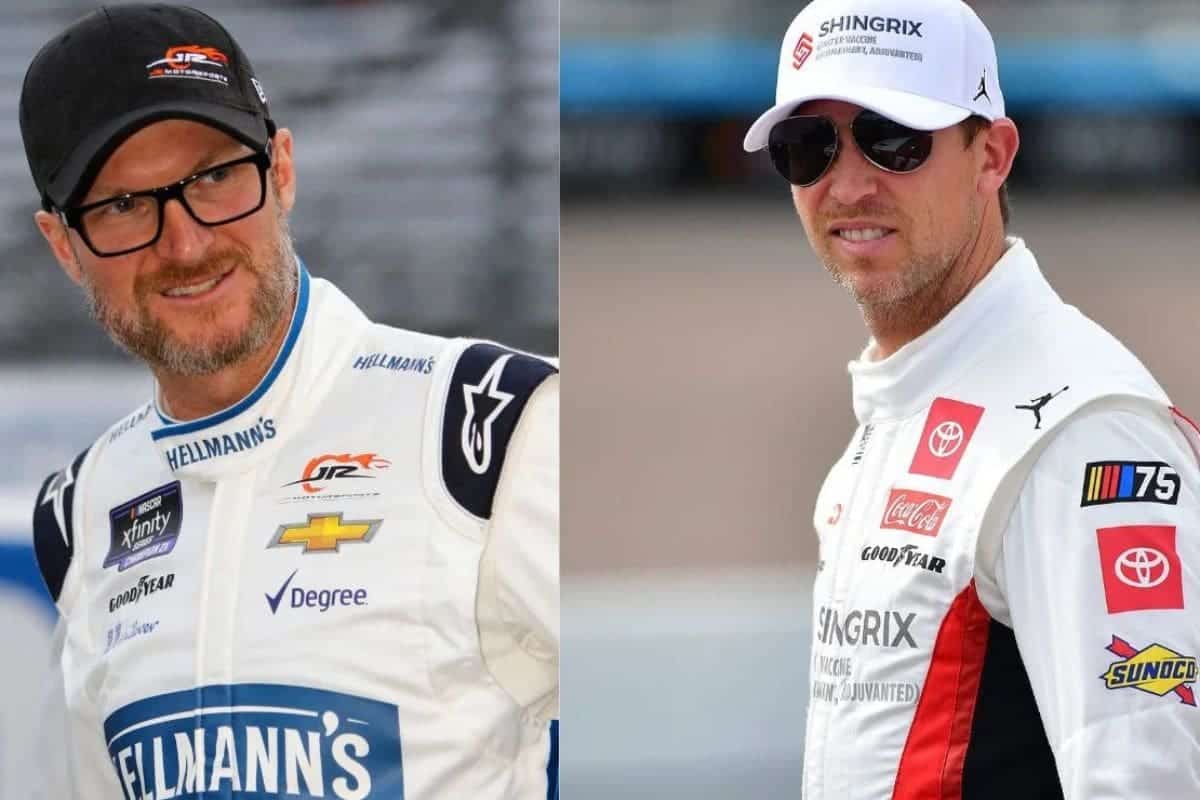Dale Jr Clashes With Denny Hamlin: The recent clash between Dale Earnhardt Jr. and Denny Hamlin over Jim France’s defense reveals deep-seated tensions within NASCAR’s strategic direction. Earnhardt’s emphasis on securing enduring media partnerships contrasts sharply with Hamlin’s alignment with France, who advocates for the financial stability offered by permanent charters. This discord highlights the intricate balance NASCAR must maintain between honoring its storied traditions and adapting to economic imperatives. As these influential figures debate, the implications for the sport’s future become increasingly complex, raising questions about how NASCAR will navigate these competing interests to safeguard its longevity and integrity.
Key Highlights
- Dale Jr emphasizes the importance of robust media deals for NASCAR’s sustainability.
- Denny Hamlin argues for permanent charters to ensure financial stability and attract new investments.
- Jim France’s leadership and decisions are central to the clash between Dale Jr and Denny Hamlin.
- Dale Jr warns against hindering NASCAR’s adaptability with permanent charters.
- Hamlin believes permanent charters can provide a predictable revenue stream for teams.
NASCAR’s Push for Permanent Charters
NASCAR’s push for permanent charters has ignited a heated debate between the organization and Team Alliance, highlighting the complexities and stakes involved in securing the future stability and economic viability of the sport. At the heart of this debate is the fundamental disagreement over the long-term implications and financial burdens associated with implementing permanent charters.
From NASCAR’s perspective, the introduction of permanent charters is perceived as a pathway to guarantee sustained investment and stability. Proponents argue that permanent charters would provide teams with a more predictable revenue stream, facilitating long-term planning and investment in technology, talent, and infrastructure. This stability could potentially attract new investors and sponsors, thereby strengthening the sport’s economic ecosystem.
However, the Team Alliance, representing a collective of team owners, views the situation through a different lens. Their disagreement lies in the potential inflexibility and the financial ramifications of such a change. Denny Hamlin, co-owner of 23XI Racing and a driver for Joe Gibbs Racing (JGR), encapsulated this sentiment with his pointed statement via X: ‘Permanent charters don’t cost anything.’ This assertion highlights the skepticism toward the perceived benefits of the proposal, suggesting that the real costs—both financial and operational—may be underestimated or misunderstood by NASCAR.
The impasse between NASCAR and the Team Alliance highlights a deeper tension within the sport: balancing the need for economic security with the inherent risks and uncertainties of competitive racing. As both parties hold their ground, the lack of a clear roadmap by the start of 2025 raises pressing questions about the future direction of NASCAR.

Dale Earnhardt Jr’s Perspective
Dale Earnhardt Jr.’s alignment with Jim France’s viewpoint highlights a significant divide within the NASCAR community, as he articulates the strategic importance of securing robust TV and media rights deals to sustain the sport amidst the debate over permanent charters. Earnhardt Jr. emphasizes that the vitality of NASCAR hinges not only on its historical legacy but also on its ability to adapt to contemporary economic realities. By highlighting the primacy of media deals, he presents a compelling argument for focusing on revenue streams that are crucial to the sport’s future viability.
Earnhardt Jr. posits that the permanence of charters could potentially hinder NASCAR’s flexibility and responsiveness to market changes, suggesting that a heavy reliance on such structures might undermine the sport’s adaptability. Instead, he advocates for leveraging media rights, which have proven to be a resilient and increasingly lucrative aspect of modern sports entertainment. This perspective aligns with the France family’s long-standing approach since 1949, emphasizing sustainability and long-term growth over immediate structural changes.
“I believe if the teams get permanent charters. Then NASCAR is obligated to support those charters through the agreement, giving them that amount of money per race that they ought to get right and getting that guarantee. Well, if TV rights just up and went away, right? You don’t know for sure where the TV rights are going to be in five or ten years.” Jr argued during the show. – Dale Earnhardt Jr
The essence of Earnhardt Jr.’s argument lies in his belief that the sport’s leadership must prioritize forging expansive and enduring media partnerships. These partnerships are seen as the bedrock upon which NASCAR can build its future, ensuring consistent revenue and broader audience engagement.
Financial Implications and Uncertainties
The financial implications and uncertainties surrounding permanent charters in NASCAR are multifaceted, potentially impacting the stability of future TV and media rights negotiations. One of the primary concerns is the allocation of revenue from the lucrative $7.7 billion TV deal, which extends until 2031. This agreement has been a cornerstone for NASCAR’s financial stability, ensuring a steady stream of income that supports teams, drivers, and the infrastructure of the sport.
With TNT and Amazon Prime Video entering the new TV deal, NASCAR has taken initial steps towards embracing streaming networks. However, the sport has yet to fully capitalize on the vast potential offered by these digital platforms.
However, the introduction of permanent charters could complicate this arrangement. Charters, by their nature, grant teams a guaranteed spot in races and a share of revenue, thereby increasing their bargaining power. This shift in power dynamics could lead to heightened financial demands from teams, straining NASCAR’s budget and potentially alienating broadcasters who might be wary of escalating costs. As Dale Earnhardt Jr. highlighted in his Ask Jr segment.
“If NASCAR knew for eternity we’re going to make hundreds of millions on dollars on TV, they would probably be more comfortable making the charters permanent because they can then financially support the agreement forever. But until they can financially know that they can support that agreement, I don’t know if they can make that commitment.” – Jr
The prospect of broadcasters pivoting to streaming services introduces another layer of uncertainty. While streaming offers growth potential, it also entails risks such as fluctuating subscription numbers and varied viewer engagement, which could impact revenue. This volatility means NASCAR could find itself needing to renegotiate terms under less favorable conditions, possibly requiring additional financial outlays to maintain team satisfaction and broadcaster partnerships.

Scenarios in the Ongoing Negotiations
Amid the multifaceted financial implications of permanent charters, the ongoing negotiations have presented several scenarios that could reshape NASCAR’s future dynamics.
The crux of the debate lies in NASCAR’s latest proposal: a seven-year extension with an option for an additional year, which starkly contrasts the teams’ demands for permanent charters. This difference in expectations raises crucial questions about the sustainability and strategic direction of NASCAR’s financial model.
One potential scenario involves teams leveraging their collective bargaining power to push for more favorable terms. A united front could compel NASCAR to reconsider its current stance, potentially resulting in a compromise that addresses both parties’ core interests. However, this approach carries the risk of escalating tensions and could lead to a standoff that disrupts the sport’s continuity.
Another plausible scenario is the specter of a boycott, evocative of the 1969 unrest, where teams might choose to boycott high-profile events like the Daytona 500 in 2025. Such a move would not only be a substantial financial blow to NASCAR but also tarnish its public image to a great extent. While this seems drastic, the historical precedent indicates that it remains within the scope of possibility if negotiations reach an impasse.
Additionally, there exists a scenario where incremental concessions are made over successive negotiation rounds. This gradualist approach may involve extending the current charter agreement while simultaneously instituting mechanisms for a periodic review, thereby creating a pathway towards more permanent solutions.
Future Outlook and Resolution
Navigating through the intricate landscape of charter negotiations, the future outlook for NASCAR hinges on the ability of both parties to reconcile their differences and forge a mutually beneficial agreement. Given NASCAR’s ownership of the racetracks and the overarching control it wields over the sport, the prospect of teams establishing a rival stock car racing series appears implausible. Such a scenario, while evocative of a doomsday outcome, remains within the domain of speculative fiction rather than imminent reality.
Historically, charter negotiations have been fraught with tension yet ultimately culminated in agreements that secured the sport’s continuity and growth. The current discord, highlighted by Dale Jr.’s and Denny Hamlin’s public disagreements, reflects the significant importance involved. However, it also signifies the robust discourse necessary for progress. NASCAR’s ability to maintain its dominance while accommodating the demands of the teams will be crucial in shaping the sport’s future landscape.
One can draw cautious optimism from past negotiations where both sides managed to find common ground. The practical approach would involve addressing the teams’ concerns about revenue sharing, investment in infrastructure, and competitive balance. Furthermore, leveraging NASCAR’s substantial influence and resources to create an equitable framework can foster long-term stability.

News in Brief: Dale Jr Clashes With Denny Hamlin
The clash between Dale Earnhardt Jr. and Denny Hamlin over Jim France’s defense encapsulates the complexities in NASCAR’s strategic direction, particularly regarding permanent charters.
While Earnhardt emphasizes the necessity of sustainable media partnerships, Hamlin aligns with France’s financial stance.
This debate highlights the intricate balance required between maintaining tradition and ensuring economic viability.
The ongoing negotiations will greatly shape the future of NASCAR, influencing both team dynamics and the broader landscape of stock car racing.
ALSO READ: Dale Earnhardt Jr.’s Reality Check: Post-Retirement Troubles

